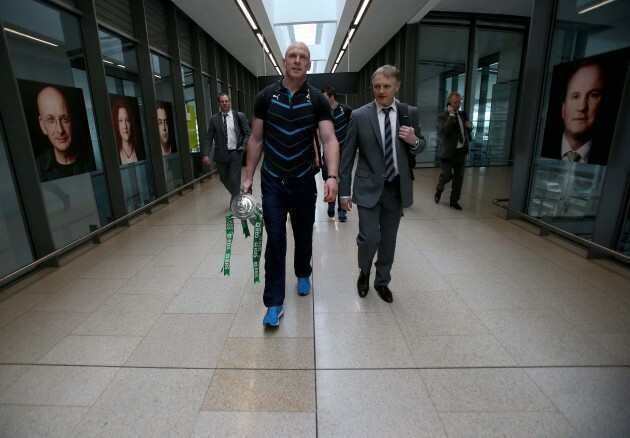IT’S A SELL-OUT, its a top-of-the-table clash, it’ll set the tone for the Heineken quarter finals but maybe the most exciting thing about this fixture is it almost replicates international intensity, and that means when the full-time whistle blows we’ll have a really clear idea of how good the fringe players are.
The onus is on the Munster men that missed out on the Six Nations to prove themselves. There will also, however, be huge curiosity surrounding the performances of Jordi Murphy, David Kearney and other Joe Schmidt selections, to see how they manage now they’re once again outside of the New Zealander’s system.
So much praise has been heaped in his direction during the championship that the focus was taken off the players at times. In a Leinster-Munster game, however, it’s all about the men on the field.
We now know for sure that Schmidt judges players in a different way to most other coaches. Wingers are being selected for their ruck technique as much as their ability to beat a man, second row players need to be stand-out tacklers as well as lineout experts, centres have to understand deception as much as be able to break a tackle. The parameters and the criterion have changed. Emerging players realise the goalposts have shifted slightly, and it will be interesting to see if they can adapt.
James Haskell is one of very few Europeans to try to make it in the southern hemisphere. He has 50 caps for England, won a Heineken Cup and a Premiership title with Wasps, but decided he needed to evolve his game.
He ended up with the Otago Highlanders, and his key discovery there, he reckons, was the utter dominance of the team ethic. Martin Johnson says the same thing of his two years in New Zealand. If a player made a 40-yard break, but failed to link up with teammates, then they were generally dropped or benched. This also applied to defenders going for the big hit (and missing), fullbacks attempting a counter attack without adequate support, scrum halves attempting quick taps, or any individual streak of brilliance that didn’t ultimately benefit the team.
The group ethic naturally applies to all levels of rugby, but its the degree to which it’s taken that counts. Joe Schmidt has taken the basic New Zealand philosophy, and moved it a step further. Andrew Trimble perfectly illustrated the new reality in an interview last year: “Joe isn’t overly concerned about a winger that breaks a gain-line and scores tries from halfway. He has to do everything to make the team tick.”
There are signs, too, that fans and analysts are also changing their outlook. Spectacular moves will always get supporters out of their seats and catch a journalist’s eye, but we saw in this Six Nations how Peter O’Mahony became a crowd favourite because of his ability to steal opposition ruck ball, a relatively subtle skill. That wouldn’t have happened five years ago.
There are changes too in the way rugby is being analysed on mainstream television, online media and in the papers. Bernard Jackman is using the video analysis skills gained from his coaching career to illustrate what really wins games these days. Shane Horgan and Ronan O’Gara have brought new life to the RTÉ panel and pitchside interviews with specifics about defence systems and power plays and kicking strategies.
Murray Kinsella of TheScore.ie has shown how online analysis can better illustrate what’s expected of modern players, adding video clips to the words on the screen, and Andy McGeady is doing the hard work on statistics, turning numbers into narratives and making it relevant and interesting.
Rugby’s main flaws — the technicalities, the inaccessibility, the many complexities, are being turned into advantages now that we, and the coaches, can consume and discuss the sport in a completely different way. Hopefully the players feel the same way.
You can follow Second Captains on Twitter here.

